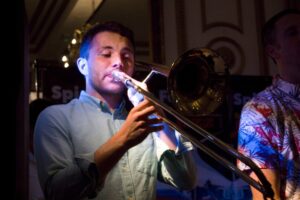Band Biographies
Alan Wakeman – Pete Johnson – Neil Hunter – Adrian Litvinoff – Dave Balen
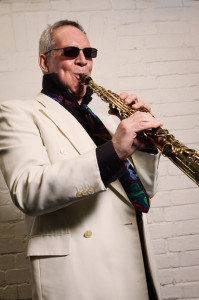
Alan Wakeman – Saxes & FluteAlan was born in West London in 1947. He became interested in jazz during the British Trad Jazz boom of the early 1960s leading to him picking up the clarinet at age 14 (his cousin Rick Wakeman giving him his first lesson in his back garden). After playing for three months, Wakeman, together with Rick on piano – the ‘only one who knew what he was doing’ – put together Drayton Manor Grammar School’s first jazz band.After taking up the alto sax at 16, he got to know Mike Westbrook when the up and coming bandleader came to his school to teach art for a year. By then Alan had decided to become a professional musician and was having lessons with Charles Chapman (Joe Harriott, Ronnie Ross, Vic Ash, John Barnes, Barbara Thompson, John Williams and Pete Whyman being among the many pupils coming out of the ‘Chapman Stable’). He left school at 18 to study clarinet at the London College of Music. In 1966, Alan took up tenor sax, which became his main instrument along with the soprano.At the age of 20, while playing in a working men’s club every weekend with cousin Rick, Alan became involved with the London jazz scene through his acquaintance with free jazz drummer Paul Lytton. They met when both were in the London Youth Jazz Orchestra (which Alan joined after he was heard by Pat Evans). He joined Lytton’s quartet for six months, playing every Wednesday night at a club in Tottenham Court Road. Later he and the drummer formed various bands together, from duo to large line-ups. In 1970 they won the Greater London Arts Association’s Young Musicians Jazz Award.
Alan’s first broadcasts for the BBC were in 1968 with The Dave Holdsworth Quartet – Paul Lytton on drums and Barry Guy on bass, and his own octet playing his own compositions in 1969 – Mike Osborne (alto sax) , Alan Skidmore and Wakeman (tenor saxes), Paul Nieman and Paul Rutherford (trombones), John Taylor (piano), Lindsay Cooper (bass) and Paul Lytton (drums).
After leading his own trio in 1970 (with Harry Miller on bass and Lytton on drums), Alan joined Graham Collier Music, replacing Stan Sulzmann. This lasted for two years and two albums, “Songs For My Father” and “Mosaics”, featuring such contemporaries as Harry Beckett, Phil Lee and Geoff Castle. Prior to rejoining Mike Westbrook’s band in late 1974, he toured with John Dankworth. Alan’s debut with Westbrook was on 1975’s “Citadel/Room 615”, and their collaboration continued with “Love Dream & Variations” (1975), “Bright As Fire” (1980) and “The Paris Album” (1981).
In 1975, Alan played briefly with pianist Brian Miller’s group Impulse. It was then that he came to the attention of John Marshall, Soft Machine’s drummer, who attended a gig by this band at the Chestnut’s Club. Alan was considered as a possible replacement for the departing Allan Holdsworth, but it would be another year before he actually joined Soft Machine, stepping in for Mike Ratledge. He was an original member of another ‘Canterbury Music’ group about this time, Alan Gowen’s Gilgamesh, but left long before any recordings were made. Meanwhile he formed a trio with Nigel Tickler on bass and John Snow on drums.
Alan was in Soft Machine from February to July 1976. This line-up was documented on the “Softs” album, recorded during the spring of that year. He left when he was offered a retainer as a member of David Essex’s band.
In 1978 together with drummer Nigel Morris and bassist Paul Bridge Alan founded the trio Triton. He also wrote a suite for octet, which was premiered at the 1979 Camden Jazz Festival.
Other collaborations in the 70’s and 80’s included Barry Guy’s London Jazz Composers Orchestra, The Don Rendell Five, Michael Garrick Sextet, Harry Beckett Band, Stan Tracy Sextet, Henry Lowther’s Quarternity and John Williams Baritone Band.
Since then Alan has kept working occasionally with Westbrook, notably the ‘Off Abbey Road’ band, while keeping busy with commercial work, West End Theatre, sessions, Pantomimes (and a great deal of teaching) and more recently with various jazz groups in and around Northampton where he now lives – and of course with Interplay.
Hailing from a musical family, and growing up listening to his grandfather play the piano, Peter’s first foray in to music was learning to play the piano aged 6. It was another 8 years before he started to learn trombone at Prince Henry’s High School in order to get in to the school Big Band. Within two years of learning, Peter was able to join Worcestershire Youth Jazz Orchestra and formed his own band Second Line playing on the Trad Jazz Club circuit. At the age of 18, he joined “The Cugini’s” Ska band.
After leaving school, Peter studied Jazz at Leeds College of Music with Kevin Holborough and upon graduating spent two years in the ship’s orchestras of Royal Caribbean Cruise Lines. Wishing to further his skills and knowledge, Peter completed a Master’s degree at Royal Welsh College of Music and Drama in 2020 studying improvisation with Mark Bassey, Geoff Simkins, Nick Weldon and Gareth Roberts and studying big band arranging with Steve Waterman.
Primarily a session player, Peter has written, recorded and performed with Neville Staple – the original Rude Boy from The Specials, as well performing with 80’s Reggae Legends Musical Youth, The Abstract Hip Hop Orchestra, Shed Seven, The Undertones and backing Beverly Knight. From 2019-2024, Peter toured with the Rush Theatre Company as trombonist with their show “Rush: A Joyous Jamaican Journey” performing in venues including Birmingham Rep, The Bristol Old Vic and Edinburgh Playhouse.
Outside of performing, Peter is an active arranger and teacher. He has arranged for Rush Theatre Company and Britain’s Got Talent semi-finalist Charlie Green and teaches music privately and in Primary Schools.
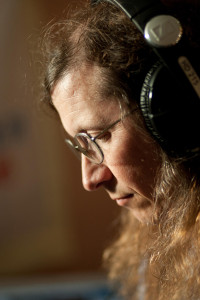
Neil Hunter – Piano, KeyboardNeil was classically trained in piano and organ at Newcastle cathedral, studied Arabic percussion with Tim Garside and has played at the Orkney folk festival. Despite (or perhaps because of) an eclectic background he has evolved into an in-demand pianist on the Jazz circuit, earning a reputation as a driving accompanist for the cream of British players including Jim Mullen, Alan Skidmore, Tony Kofi, Art Themen, Dave O’Higgins, Alan Barnes, Dick Pearce, Dennis Rollins, Karen Sharp and Henry Lowther. He is also a sideman of choice for American visitors such as Greg Abate, Gary Smulyan and Sheryl Bailey.As a session player on UK and US dance music labels Neil has a clutch of album credits, named alongside Jeff Lorber, Robin Jones and Barry Finnerty (ex Crusaders, Brecker Brothers), played on a ‘club classic’ of the early 2000s and, with the Black Gold Massive, has a following in Japan. He has played at festivals throughout the UK and as far afield as Finland (with the Afro Elements) and Jamaica (with Sonny Bradshaw).Neil grew up in the northeast, where in the 1970s Heavy Rock and Folk music were influences in equal measure and concept and fusion projects were almost mainstream. Witnessing the recording of ELP’s ‘Pictures at an Exhibition’ at Newcastle City Hall, and XTC’s performance on C4’s “The Tube” were almost certainly formative.
After moving to the Midlands to study engineering, Neil was instrumental in the resurgence of both Jazz/Funk and NuYorcian Salsa in the 2000s, acting as the mainstay of a number of East Midlands clubs, while at the same time (thanks to a multicultural environment and an indirect association with Black Voices) he also developed a healthy Gospel pedigree.
Neil joined Interplay in 2008. More recently he has contributed to contemporary projects, featuring alongside Tony Kofi on Matt Chandler’s critically acclaimed second album, and playing with “Taba Time” to showcase the extraordinary compositions of Hawaii’s Dean Taba.
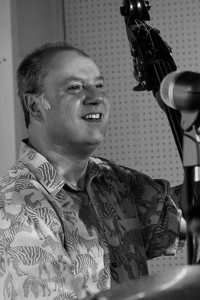
Adrian Litvinoff – Basses & ComposerAdrian was musically active from childhood but took some time to find his way. Piano and violin lessons were of limited appeal so in his teens he gravitated to performance in jazz groups with friends, playing piano. A lack of bass players encouraged him to take up electric bass and this opened the way to exploring many more musical styles, all of which were close at hand in London’s vibrant music scene of the mid to late 1960s. Jazz and Blues bands led to paid work around town, including at the Coffin Club, formerly Ronnie Scott’s in Gerrard Street, where the drummer John Stevens and singer Maggie Nichols were wont to come by and sit in. A psychedelic rock band formed from school provided an early opportunity for Adrian to begin composing, and played at venues including Eel Pie Island. Meanwhile a ‘gap year’ job at Swiss Cottage Record Library offered him the opportunity to expand his listening to the latest releases from the US and UK.In 1969 Adrian travelled overland through the Middle East to India and Nepal, bringing him personal encounters with music of other cultures, and this interest grew during his time at York University. Although studying English and Related Literature, it was in the Music Department that he was often to be found. Student bands came and went, one with avant-garde pianist Steve Beresford. At this time Adrian formed his first full-time band with his close friend and musical companion Stuart Cohen, a fine guitarist and song-writer.
Adrian relocated to London in 1973. He began a jazz fusion band, Fatal Error, which included saxophonists Joseph Kucera (aka Saxophone Joe), Steve Pheasant and Shaun Bergin as well as John Dennis, piano and Richard Burgess, drums. The band gigged around London including regular appearances at the Three Horseshoes in Hampstead and the historic Troubador coffee bar in Old Brompton Road. Another rock band ‘Blaze’ with Stuart Cohen played clubs and support spots at colleges and festivals.
Adrian continued to study piano and composition under Peter Sandler, attending classes at the City Lit. He began writing for diverse formats including big band, and found occasional arranging work and recording sessions, even including a Nigerian Hi-life band.
In 1975 Adrian moved to Oxford, where the Old Fire Station Arts Centre offered a base to expand his activities. He began by conducting a community orchestra and establishing a jazz workshop. A new quartet followed, and incidentally led to Adrian’s first performance with Alan Wakeman as guest.
About this time Adrian was lent a double bass by Erika Lyons – her ‘spare’ – and took lessons at the Guildhall School of Music with classical bassist John Steer. Bands in Oxford featured saxophonist and educator John O’Neill, drummer Nigel Morris, pianist Ted Gioia, and a quartet with pianist Brian Waite and later Alex Steele. There was a broadcast for BBC Radio 2. Adrian also developed collaborations with contemporary dancers, and was fortunate to perform in the company of John Surman, Tony Oxley, Michael Garrick and Norma Winstone. The sextet ‘Crosscurrents’ was entirely based around Adrian’s writing. It toured regionally for a couple of years and recorded an album at Peter Ind’s Bass Clef Studio.
At the Arts Centre Adrian became involved with alternative approaches to music education. This developed into a major interest for him, leading to projects with such musicians as John Stevens, Steve Berry, Chris Batchelor, and Tony Haynes and the Grand Union Orchestra. He also began programming jazz events, and with composer-in-residence Simon Bainbridge staged a day-long community performance of ‘In C’ by Terry Riley.
Moving to Warwickshire in 1986 Adrian was able to expand his partnership with Grand Union, facilitating ground-breaking initiatives in school music and development for teachers and community musicians. This afforded him the opportunity to learn from musicians such as Vladimir Vega and Carlos Fuentes, Claude Deppa and Chris Biscoe, and culminated in the creation of ‘If Music Could’ in 1990.
Continuing to play and write, Adrian performed for a while with Steve Tayton and Ben Parkinson before joining Footprints with Graham Dent and Steve Street. They went on to record the album ‘No Hurries’, featuring many of Adrian’s tunes and produced by Tim Whitehead. Adrian also toured with Neol Davies’s 8-piece Ska band Selecter Instrumental. Later he appeared with jazz groups such as the Don Ellis Connection, Loco Mundo, Jucamaya (with Ian Hill), and supported artists such as Karin Krog, Alan Barnes, John Hallam and Digby Fairweather.
From 2007 Adrian was able to devote more time to music. Interplay was the immediate result, and the band plays throughout the Midlands and beyond. Afforded the talents of Alan Wakeman, Richard Baker, Neil Hunter and David Balen, Interplay is the fullest expression of Adrian’s diverse musical interests to date. Their debut CD ‘Introducing Interplay’ came out in 2010 and a second album ‘Global’ was released in the autumn of 2013. Gilles Peterson called it a ‘beautiful record’.
in 2008 Adrian was invited to join Celtic Fusion band Shkayla, led by Limerick-born violinist and composer Joe O’Donnell, whose former work includes East of Eden, Rory Gallagher and Isla St. Clair. Shkayla, featuring guitarist Si Hayden, draws on music from many cultures as well as the Celtic tradition and keeps Adrian in touch with his rocky side too!
Adrian trained as a Music Leader in 2008, resuming his music education work in association with Warwickshire’s Adult and Community Learning Service. He had a well-established workshop practice in teaching jazz improvisation to adults as well as double bass and electric bass, and ran participatory music sessions for pre-school and primary-aged children and their carers and trained sessional tutors to cascade the work.
Adrian continues to perform in a wide spectrum of other settings, mainly jazz, blues and soul. He was resident bassist for the Spa Jazz sessions, which present such notable performers as Roy Forbes, Mike Fletcher, Arnie Somogyi, Chris Ingham, Neil Bullock, John Wheatcroft and Tony Kofi.
The arrival of International Jazz Day has provided a new opportunity for Adrian and Interplay to stage one-off concerts with prestigious guests such as Claude Deppa, John Etheridge, Annie Whitehead, Norma Winstone, Alina Bzhezhinska, Tony Kofi and Byron Wallen.
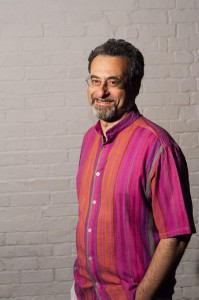
Dave Balen – Drums & PercussionWith his father Harry having been a well-established figure in the dance bands of the 1930s and 40s, Dave was always likely to move into music. Even so his has been a very unusual journey – both eclectic and varied…Although his first love was and still is Jazz & improvised music Dave became intrigued by and drawn to Indian Classical music. On leaving school he hit the road to India for a year from 1967-68, picking up techniques & inspiration along the way. On returning to the UK, his professional career began in the blues and rock bands of the late 1960s, working with Shakey Vick Chicago Blues Band, Quintessence (Raga Rock) and doing various recording sessions and gigs in the contemporary music of the time.Over the years, Dave worked & recorded with many musicians on the folk scene, such as: US Artist Amory Kane, Tim Hollier, Andy Fernbach, Mick Softley, Mick Greenwood as well as Jazz/crossover artists such as Roger Bunn, Lyn Dobson, Jonathon Coudrille and others, culminating in the 90s with Time and Again, an eclectic group that included for a time Dave Swarbrick on violin.
He briefly studied tabla with Alla Rakha, one of Ravi Shankar’s main accompanists. In the 1980s, he was a member of the troupe of Surya Kumari, the well known Indian Actress Singer and Bharata Natyam Dancer, playing South Indian Percussion (Mridangam) in various concerts over the years on the South Bank. Some of these included various guest musicians and celebrities, including Larry Adler and Actor Ben Kingsley.
Meanwhile Dave’s eclectic approach and openness to the music of other cultures brought him to learn and play African, Middle Eastern, Latin American and traditional Irish percussion, while continuing to learn aspects of Indian drumming and music. He studied briefly with Hossam Ramzy the Egyptian Tabla maestro, learned the Irish Bodhran, Flamenco Cajon and has also studied Drums with Jazz Master Clark Tracey.
Over the last 45 years or so, Dave has taken part in numerous cross-cultural collaborations and musical encounters both professionally and informally with a diverse collection of people such as Davy Graham, Raja Ram, Tim Wheater, Jon Harle, Jim McCarty (of Yardbirds and Rennaissance) Vo Fletcher, Dave Swarbrick, Peter Ind, Louis Cennamo, Alan Wakeman and many others. He has also played and recorded with the “New Age Music” group Stairway on their popular Instrumental Album “Medicine Dance”.
Dave has conducted educational Rhythm Workshops for many years and continues to develop his craft as well as playing tablas & percussion for Indian Kirtan Groups and Voice Workshops.
For the last ten years Dave has been writing, engineering and recording his own material, and working with the Bassist and Composer Adrian Litvinoff. Dave’s album “Moments in Time” should be out in 2014.
Dave continues working in Jazz or Improvised music settings and various collaborations with musicians from many different environments but mainly in the progressive jazz and other types of crossover/improvisation groups.




